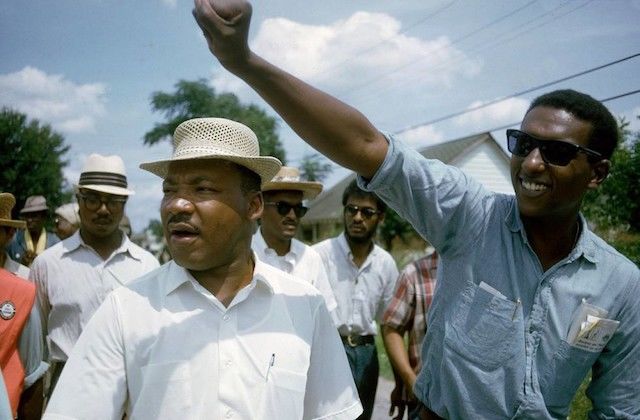Remembering Dr. King with Producer Trey Ellis
Photo by Bob Fitch / Courtesy of HBO
Dr. Martin Luther King Jr. and Stokely Carmichael marching in the Meredith March.
April 16, 2018
HBO’s new documentary “Into the Wilderness” focuses on the last three years of Dr. Martin Luther King Jr.’s life after Birmingham, “I Have a Dream” and Selma. Zooming in on this less publicized time in King’s life, the documentary seeks to evolve the national narrative on the late Reverend.
In conjunction with the Center for the Study of Transformative Lives at NYU, the Skirball Center for the Performing Arts hosted a screening of the documentary on April 9. Afterwards, NYU’s Chief Diversity Officer Dr. Lisa Coleman and historian David Levering Lewis sat down with the show’s Executive Producer Trey Ellis to discuss “Into the Wilderness” and its subject’s gargantuan legacy.
WSN spoke with Ellis after the packed event, and the producer was able to delve into details not covered in the talk.
For the documentary, Ellis was lucky enough to have interviewed many of King’s closest allies. He hoped to bring a fresh perspective on the icon and capture what he calls “the ghost of Dr. King.” Ellis had a drive to find the real King, and those close to him were ecstatic with the opportunity to set the record straight.
As the interviews were recorded and transcribed, it became clear that King’s personal politics were much more progressive and radical than previously thought, according to Ellis. He talked about the fact that some of the biggest issues King tackled in his final years were poverty in all forms and the growing fear of militarism — efforts that have been sanitized from public discussion.
But it is what Ellis learned about King’s personal life that proved much more striking.
“His loneliness, his depression, the pressure he was under … all of his associates talked about how it hurt them that they couldn’t take his weight off,” Ellis told WSN.
The way Ellis described King’s life in those final years was almost harrowing, giving tangible weight to the burden of being a legend.
As with many history-shaping figures, King’s life, achievements, beliefs and humanity have been simplified, sanded down and whitewashed into a simple, digestible vision. Textbooks have very little room for nuanced men and women, but they have plenty of room for archetypes, heroes and inoffensive versions of radical, groundbreaking people.
Ellis hopes that by making “Into The Wilderness,” Martin Luther King Jr. — the person and the radical progressive — can be written back into the textbooks.
“We started working on the film right after the election, and it struck us that his true message has never been more relevant and that we could activate people,” Ellis said. “He was not perfect, but he did all of this work, so what is our excuse?”
For Ellis, the experience was transformative. He described meeting with Jesse Jackson, a civil rights activist and Baptist minister, and other close friends of King. Ellis had never seen these influential figures so up close and personal as Jackson reflected on the final nights of King’s life and Diane Nash, another civil rights activist, recalled meeting Ellis’ parents at Howard University.
“I feel like I developed a sort of personal relationship through talking to his friends,” Ellis said. “Every time I watch the film, I feel his loss on a personal level.”
“Into the Wilderness” looks to break King out of the mold that pop culture has forced his memory into. It allows audiences to see him as the nuanced, difficult and inspirational human that Jackson and Nash knew him to be. History and textbooks simplify our heroes and leaders to make them easier to understand. In our political climate, seeing a real, tangible human who fought for what was right might be exactly what we need to get out of the wilderness.
A version of this article appeared in the Monday, April 16 print edition. Email Carter Glance at [email protected].












































































































































